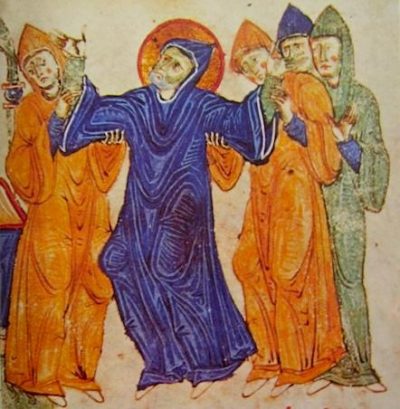That the whole observance of Perfection is not set down in this Rule

CHAPTER LXXIII. That the whole observance of Perfection is not set down in this Rule
1 May. 31 Aug. 31 Dec.We have written this Rule, in order that, by observing it in Monasteries, we may shew ourselves to have some degree of goodness of life, and a beginning of holiness. But for him who would hasten to the perfection of religion, there are the teachings of the holy Fathers, the following whereof bringeth a man to the height of perfection. For what page or what word is there in the divinely inspired books of the Old and New Testaments, that is not a most unerring rule for human life? Or what book of the holy Catholic Fathers doth not loudly proclaim how we may by a straight course reach our Creator? Moreover, the Conferences of the Fathers, their Institutes and their Lives, and the Rule of our holy Father Basil – what are these but the instruments whereby well-living and obedient monks attain to virtue? But to us, who are slothful and negligent and of evil lives, they are cause for shame and confusion. Whoever, therefore, thou art that hasteneth to thy heavenly country, fulfil by the help of Christ this least of Rules which we have written for beginners; and then at length thou shalt arrive, under God’s protection, at the lofty summits of doctrine and virtue of which we have spoken above.
The concluding chapter of the Holy Rule can also be read as an introduction to it. In fact, one might think of Chapter LXXIII as a kind of preface to the Prologue, which we shall begin reading tomorrow. Chapter LXXIII is best read in the light of what Saint Gregory the Great says in the Second Book of the Dialogues:
The man of God, among so many miracles wherewith he shined to the world, was also eminent for his doctrine, for he wrote a Rule for Monks both excellent for discretion and eloquent in style. Of whose life and conversation if any wish to know further, he may in the institution of that Rule understand all his manner of life and discipline, for the holy man could not possibly reach otherwise than he lived. (Dialogues II:36)
Saint Benedict emerges from this chapter as a man of profound humility and poverty of spirit. He has all the greatness of the patriarch and, at the same time, all the littleness of a child. Psalm 130, which he quotes at the beginning of Chapter VII, gives us, I think, a faithful spiritual portrait of our legislator, our patriarch, our leader:
Lord, my heart is not lifted up, my eyes not raised from the earth; my mind does not dwell on high things, on marvels that are beyond my reach. Bear me witness that I kept my soul ever quiet, ever at peace. (Psalm 131: 1–2)
In his humility, Saint Benedict claims no originality, no ground–breaking insights. Saint Benedict is the man of tradition, and he refers us back to the sources from he himself received. Like Saint Paul, he can speak of “the tradition which I received from the Lord, and handed on to you” (1 Corinthians 11:23). First of all, Saint Benedict refers us to the Sacred Scriptures, which he calls “the teachings of the holy Fathers.” Here, the expression, “the holy Fathers”, designates the divinely inspired authors of the Sacred Scriptures: Moses and the prophets, the Apostles and Evangelists. Next, Saint Benedict speaks of the holy Catholic Fathers: among these would figure Saint Athanasius, Saint Ambrose, and Saint Augustine and, of course, Saint Basil. Saint Benedict sends his monks to the Saint John Cassian and to the Fathers of the Desert. The Benedictine monk, like his glorious patriarch, is, by definition, a man of tradition.
Finally, Saint Benedict, using the second person singular, addresses the individual monk as a son. It is clear that any God–seeking man can become the son of Saint Benedict: “Whoever, therefore, thou art. . . .” Saint Benedict will adopt any man who has set his heart on heaven and is willing to undertake the journey, by truly seeking God, by embracing, obedience, and by submitting to the inevitable and necessary humiliations (cf. Chapter LVIII).
Seek the things that are above; where Christ is sitting at the right hand of God. Mind the things that are above, not the things that are upon the earth. For you are dead; and your life is hid with Christ in God. (Colossians 3:1–3)
